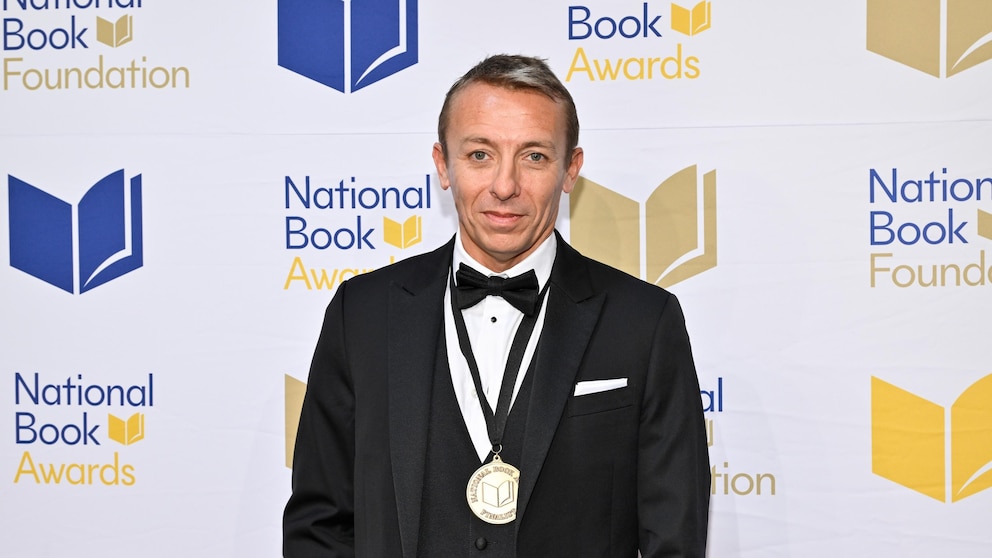
NEW YORK — Justin Torres’ novel “Blackouts,” a daring and illustrated narrative that blends history and imagination in its recounting of a censored study of gay sexuality, has won the National Book Award for fiction.
On Wednesday night, the nonfiction prize was awarded to Ned Blackhawk’s “The Rediscovery of America: Native Peoples and the Unmaking of U.S. History” and young people’s literature was won by Dan Santat’s “A First Time for Everything.” Craig Santos Perez’s “from incorporated territory (åmot),” the fifth work in his series about his native Guam, was cited for best poetry, and Stênio Gardel’s “The Words That Remain,” translated from Portuguese by Bruna Dantas Lobato, won for literature in translation.
Torres, whose book imagines a conversation between a dying man and the young friend he educates about a real history called “Sex Variants,” gave a brief acceptance speech before he was joined by more than a dozen nominees who gathered to present a statement about the Israel-Hamas war. Read by fiction nominee Aaliyah Bilal, the statement condemned the “ongoing bombardment of Gaza,” antisemitism, anti-Palestinian sentiments and Islamophobia and called for a humanitarian cease-fire. The authors received a standing ovation after Bilal finished.
One sponsor, Zibby Media, had withdrawn support out of concerns the statement might be antisemitic and anti-Israel.
Oprah Winfrey gave an emotional keynote address during the dinner ceremony at Cipriani Wall Street, and honorary medals were presented to poet Rita Dove and to Paul Yamazaki, a longtime bookseller at San Francisco’s famed City Lights store.
Winners in the five competitive categories each received $10,000.
The night’s unofficial themes were self-expression, voices silenced and raised and the way literature can, as Dove described it, summon the voice of our “unarticulated disturbances.”
The National Books Awards are a tribute to words and the right to read, as embodied this year by event host LeVar Burton and Winfrey. Burton, a longtime champion of reading, marveled that he and Winfrey, both descended from enslaved people, could become “symbols for literacy, literature and the written word.”
Winfrey, seated during dinner between book club choices Jesmyn Ward and Abraham Verghese, became tearful as she spoke of her lifelong passion for words and reverence for authors. She quoted from such favored works as Alice Walker’s “The Color Purple” and Barbara Kingsolver’s “Demon Copperhead” and condemned those who ban books, calling censorship an act of isolating people into “soulless echo chambers.”
Books, Winfrey said, should be within reach “of everyone to choose for themselves.”
Hundreds attended the National Books Awards, raising more than $1 million for the National Book Foundation, which oversees the event and provides a wide range of public and educational programs. Booksellers and others judge panels of writers and select awards finalists and winners of the competitive categories, for which publishers submitted a total of more than 1,900 works.
The National Book Awards also are a literary celebration that often overlaps with current events, whether the election of former President Donald Trump, a prime topic at the 2016 ceremony, or the badges of support some wore last year for striking workers at HarperCollins Publishers.
Wednesday’s original host, Drew Barrymore, was dropped in September by the book foundation after she renewed the taping of her talk show while Hollywood writers were still on strike. Zibby Media and Book of the Month both declined to attend the ceremony, although only Zibby withheld its financial backing, according to the book foundation. The decision came before Zibby Media could be removed from the program guide, which listed the company as a “bronze” donor, between $25,000 and $49,000.
A full-page ad from Zibby appeared in the guide, opposite a full-page ad from Simon & Schuster for Bilal’s story collection “Temple Folk.”
Many of the winners spoke of using books to demonstrate and champion their own communities, whether the Native Americans in Blackhawk’s work of history or the Pacific Islanders of Perez’s poetry.
The fiction nominees were themselves a kind of collective statement, dramatizing those overlooked or oppressed, whether the brutalized prisoners of Nana Kwame’s Adjei-Brenyah’s “Chain Gang All-Stars: A Novel,” the Nation of Islam members in “Temple Folk” or the Maine island devastated by racist theories in Paul Harding’s “This Other Eden.”
Nominee Hanna Pylväinen, whose work “The End of Drum-Time: A Novel” focuses in part on the Indigenous Sami of 19th century Scandinavia, says one of the purposes of fiction is showing that “no matter what the community” we could “be any one of those people and that we can see how those people got to be where they were in their lives.”
Winfrey, in her speech, said books were a path to helping us relate to people we otherwise “have nothing in common with.” She then quoted the late Toni Morrison: “The function of freedom is to free someone else.”
